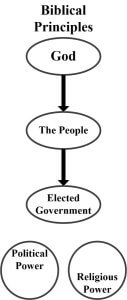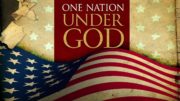Over the last several years, a new label appeared in our culture. It is Christian Nationalism or white Christian Nationalism. These are just variations of the same idea. We’ve been in an open war since 2020, but this one is generally fought with ideas, culture, information, media, economics, and the like, rather than guns and bullets. A total war, or people’s war.
There are only two sides in this war. We must each make a choice. Not making a choice is a choice. To fully understand the concept of Christian Nationalism (CN), and its implications, we must first understand the structures and ideas underlying it.
We will find CN is simply another application of critical theory. No different from that theory’s recent application to race, transgenderism, or the Israeli/Palestinian conflict and its campus protests. It’s all connected. To understand CN, we are first going to look at two governance models, their underlying ideas, and critical theory itself.
I recently heard a speaker discuss white CN. His name doesn’t matter. He very much believed everything he said; a product of our current education system. It’s sad. I’m not sure which is more disappointing; a society that no longer teaches truth to its young, or one that is surprised when those students act upon what they’ve been taught. There is at least one thing I agreed with the speaker about, “We owe each other the truth.” I’ll do my best to provide that in this series. My purpose is to educate. (Eph. 4:13-5)
Biblical Governance
I’ve written about this model many times before. This time, I’m going to start with its source and an implication. Then move on to the second model. This first model originates from two places within the Bible. The first is Genesis 1:26-8 and the second Deuteronomy 1:13-7. In Genesis 1, God created everything ever created; He is therefore sovereign over creation. It belongs to Him.
Other ideas from the Genesis passage include God’s;
- Making man in His own image and likeness.
- Granting man dominion over the things of the earth, but not the earth (land) itself. Dominion is the lawful granting of authority by a sovereign to someone else. More on this later.
- Placing trust in man by granting him dominion over the things of the earth. This granting of trust created the first trust, and is the beginning of all law. More on this, too.
From the Deuteronomy passage;
- Leadership is through service to others. The judge’s were to exercise righteous judgement without prejudice. Within the New Testament, see Mark 10:42-5.
- Leaders were to come from the people, be elected by the people, in order to support the common good. New Testament examples include; Acts 1:23-6 and Acts 6:1-6.
Governance and Religion
God appointed Moses Israel’s first judge. The rest were to come from the above process. Aaron and his tribe were appointed by God to serve as priests. (Exodus 28) The Levite’s service ended with the second temple’s destruction. People today voluntarily choose serving God, as the disciples did in the Gospels. They learned and then taught God’s commands; the knowing and doing depicted in Matt. 7:24-5. Judges have continued to judge law violations. These institutions, the powers of governance and religion, were separate—but related. Religion teaching people the law; governance enacting justice when the law is violated.
The Model Itself
So what does the model look like? It is diagrammed below.

Within this model, God created the people. The people were given God’s image and likeness, and dominion over the things of the earth. The people are sovereign through God’s granted authority. They elect their leaders, who are chosen to serve the common good. Within this model, religious and political power are separate, and both serve society in different ways as noted above. While those with political power (the judges) were separate from those with religious power, they were all still subject to God’s law. One law applied to all, as all belonged to one class—man.
I’ll pick up the principles inherent in this model, with their sources, next time. Now, on to the second model.
Man’s Governance
This model begins with man. It is pagan, and I’ve referred to it in the past as the State Religion model. It is the general governance model used by most kingdoms we’ve studied in history; Babylonia, Persia, Assyria, Egypt, Greece, Rome, etc. Each city had its own god(s). They had a religious and/or secular ruler, and they ruled the people. Religious and political power within these societies were not the same, but they were very closely related. Rule here is about power, not service.
Political power provided the means for creating policy and statutes. It also had the ability to enforce them via a military and legal system. However, a moral people is easier to govern. Religion provided the moral underpinnings enabling the state to create policies and statutes in its own best interest. Within these societies, it was the ruler, and those to whom the ruler granted dominion, who were sovereign. The people existed to see this societal structure was successfully preserved and carried into the future. These societies all had class structures.
The two models could not be more different. This second model is diagrammed below.

I’ll also look at the principles inherent in this model next time. In closing, I mentioned picking up law earlier. This article will close with those thoughts.
What is Law?
Law can be defined as a permanent rule prescribed by a society’s supreme authority—its sovereign. Therefore, law is derived from a society’s governance model. Within Biblical governance, God is creation’s sovereign, and His law is prescribed through both nature and revelation—natural law. There are three areas of law (jurisdictions) created in Genesis. All of these areas come from the verses mentioned earlier in Genesis 1. Note, none of this is legal advice, but is presented for educational purposes only.
Trust Law
The first area is trusts. God placed trust in man when granting him dominion, creating the first trust. All trusts have three parties; a grantor, trustee(s), and beneficiary(s). God as creation’s creator is the trust’s grantor. God placed the things of the earth into trust with man. A grantor places assets into a trust for benefit of another—service again. Trusts can be created through writing, orally, or even through the parties actions. Trustees are responsible for complying with the trust’s rules. Beneficiaries are those for whose benefit a trust is created.
Man is both trustee and beneficiary within this first trust. All trusts have rules which are stated within a contract called an indenture. This first trust’s indenture is the Bible. It was likely originally implied by actions, later spoken, and at some point written down. It contains God’s rules for the trust (revealed law), and the benefits to be received when the rules are followed.
Think this is not the case? Check out Deuteronomy 27 (curses), 28 (blessings), and 30 (our choice). I believe the Israelites also recognized this trust arrangement. That is one reason why lineages are a significant part of the Old Testament. If one could not trace their lineage back to one of the Old Testament families, clans, or tribes; then they were not a beneficiary of God’s promise to Abram.
Common Law
Common law, the second area, concerns rights and title. We’ll discuss rights and law first. Three of the four areas within the private side of common law are present in Genesis 1. These are Personal Security, Personal Liberty, and Property. At creation, man was given life (Personal Security), reason and language (Personal Liberty), and placed within abundance meeting his every need (Property). When God created woman in Genesis 2:18, 21-4, the family was created and a fourth area of private common law (Private Relationships) formed. Each area protects rights inherent in our God given nature. Except for the trust law mentioned previously, common law was created before all other law. Common law is therefore superior to all law but trust law.
Notice creation came first. Natural rights are inherent in our nature—our creation. These rights therefore come before law. Natural law recognizes and is derived from our nature. Common law is derived from natural law.
Common Law’s Source
What is natural law? It is the law of nature and revelation, prescribed by God.
“Upon these two foundations, the law of nature and the law of revelation, depend all human laws; that is to say, no human laws should be suffered to contradict these.”[1]
“The law of nature … is that which God, the sovereign of the universe, has prescribed to all men, not by any formal promulgation, but by the dictate of right reason alone. … [I]t comprehends all the duties we owe either to the Supreme being, to ourselves, or our neighbors.”[2]
Natural law is also called the moral law. Christian principles from natural law form common law’s foundation. America’s law is based upon Common Law.
“England never accepted the Roman civil law, … The English civil law is divided into Common Law or lex non scripta (i.e., not written at first), or Statute Law or lex scripta. They are related to each other as oral tradition and the Bible are in theology. … It [Common Law] is Anglo-Saxon in its roots, and moulded by Norman lawyers, under the influence of Christian principles and equity. Blackstone, the standard expounder of English law, says, ‘Christianity is a part of the Common Law of England.’”[3]
We’ll talk more about rights in conjunction with America’s founding later. For now, just know that our rights; come from God, and precede natural law. They are unalienable, meaning no lien can be placed against them.
Title
Title has to do with the right of ownership and/or beneficial use. These, too, have their basis in the Bible. A natural person (i.e., a man/woman) may have both or only one type of title in relation to an object. God made a distinction between land and the things of the earth—between real and personal property. The land is not to be permanently sold. We only have the right of its use (Lev. 25:23). Further, we see this same principle at work in the parable of the bags of gold/talents (Luke 19:12-27). The king (God) gave the use of gold to his servants, but retained its ownership. The king demanded an accounting when he returned. We are given beneficial use of the things over which man was given dominion—the things of the earth. We do not own them if we did not create them.
It is different with the things we create through our labor, either directly or indirectly. Labor is a natural right, and we have the right to keep the fruits of our labor. It is God’s gift to man (Eccl. 3:12-3). For these things (personal property) we have both ownership and right of beneficial use. This is consistent with God’s title through His act of creation; a part of His image and likeness man bears. It also means we are able to create trusts with the things we create through our labor—just as God did. We can pass ownership and/or beneficial use for another’s benefit through a trust we create.
Contract Law
The third area is contract law. While a trust is a contract, we also see a clear and separate example in Chapter 2:15-7. God placed man in the Garden to cultivate and care for it, and in return it would supply all man’s needs. God placed one condition on the contract. Man must not eat from the tree of the knowledge of good and evil. When man ate from the tree, he broke the contract and was cast out of the Garden. Man also broke his spiritual relationship with God as man rebelled against God.
Contracts can also be written, oral, or implied by the parties actions. However, common law contracts differ from Roman civil law contracts. Common law contracts require;
- An agreement between like kinds (living men/women or legal fictions such as corporations—no mixing of types),
- Competency to create a contract,
- A meeting of the minds between parties,
- Free and genuine consent between parties,
- Full disclosure of all terms and conditions,
- An exchange of real value (consideration),
- Signatures of all parties, and
- Privity, meaning only the parties named in the agreement are part of it.
Roman Civil Law
This law is the child of the pagan governance model. As man is sovereign, this law varies from that of the Biblical model. With Rome’s fall, its governance disappeared, replaced by Germanic tribal rule. The new kingdoms were generally small, limited in size by the European terrain. The new rulers needed the support of those they attempted to govern. While Rome’s influence was gone, the Church remained. These new rulers relied on the Church; they often did not know the people or speak their language. The Church also held records, documents, and provided education.[4]
Roman civil law’s influence largely disappeared after the Empire’s collapse. England came under Norman influence through William the Conqueror from 1066 – 1087. Additionally, a copy of Justinian’s writings was discovered in about 1130. Both almost destroyed Common Law. In Blackstone’s words, “And an accident, which soon after happened, had nearly completed its [Common Law’s] ruin. A copy of Justinian’s pandects, being newly discovered at Amalfi, soon brought the civil law into vogue all over the west of Europe, where before it was quite laid aside and in a manner forgotten; though some traces of its authority remained in Italy and the eastern provinces of the empire.”[5]
Only two countries have used Biblical governance; Israel of the Bible and America. All others have followed the pagan model. England was different with its common law, which largely came from the island’s Germanic invasion by the Angles, Saxons, and Jutes in the 5th century. Common law formed the basis for America’s law at the country’s founding.
What Are Some of the Differences?
Not all Roman civil law is bad. However, it is rooted in man’s nature rather than God’s. Roman civil law is declared through statutes, code, regulations, ordinances, etc. This type of law exists in America today; a lower form of law all based upon contracts. How we got there is a topic for another time. Just know America began with Common Law and transitioned over a period of time to Roman civil law.
Some differences from common law include;
- Trusts are constructed from statutes rather than common law. They are recorded (public), whereas common law trusts are often unrecorded (private).
- Rights become privileges, granted by the governing power—derived from civil law. They are conditional rather than inherent, subject to licensing, registration, recording, regulations, etc.
- Title is shared. The governing power owns all property. The right of beneficial use is granted to persons; subject again to licensing, registration, and various rule and regulatory compliance. This forms the basis for property taxation, something America’s founders rebelled against.
- Contracts form the basis of pagan governance, including the trusts, rights, and titles just noted. These contracts are between legal fictions, such as corporations, persons, trusts, associations, etc. Below are a few significant differences.
- The common law requirements for contracts are not necessary.
- There is no need for a meeting of the minds or disclosure. An offer is made, normally by someone in authority. If the offer is not rejected, it is accepted. Silence presumes acceptance.
- After acceptance, if a person later changes their mind, they break the contract and must defend their action. There is no longer an assumption of innocence and proving of guilt.
Much is at stake. Do you see it? We’ve covered a lot of ground, so I’ll end for now.
Footnotes:
[1] Blackstone, Sir William, p.42, Commentaries on the Laws of England, Vol. I, The Clarendon Press, Oxford, 1765.
[2] Bouvier, John, p. 4, Institutes of American Law, Vol. I, Robert E. Peterson & Co., 1854.
[3] Schaff, Philip, p.348, History of the Christian Church, Vol. IV, Christian Classics Ethereal Library, 1910.
[4] For more information see, Wolf, Dan, pp. 4-30, The Light & The Rod; Biblical Governance Corruption, Living Rightly Publications, 2020.
[5] Blackstone, Sir William, p. 11, Commentaries on the Laws of England, Vol. I, The Clarendon Press, Oxford, 1765.



